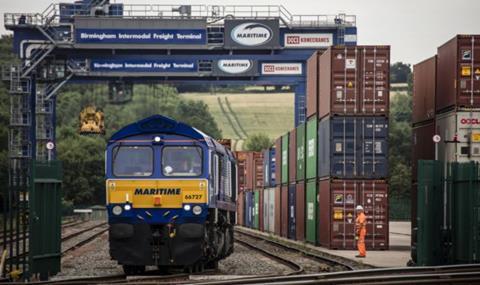
Maritime Transport has launched a new intermodal service from Birmingham to the Port of Felixstowe to provide additional capacity in response to the UK’s HGV driver shortage.
The service, hauled by GB Railfreight, connects Maritime’s Birmingham Intermodal Freight Terminal (BIFT) with the Port of Felixstowe.
Maritime, which operates a fleet over 2,000 trucks and 3,000 trailers, saw its third train to run from the Port of Felixstowe to BIFT set off today on (10 January). The new service has increased Maritime’s Felixstowe to West Midlands capacity by 40% and runs five days a week from Tuesday to Saturday, with a total transport capacity of 87 TEU in each direction.
Maritime has invested more than £4.1m in container handling equipment at BIFT since acquiring the terminal back in 2014, which now benefits from two Konecranes Noell N SC 644 E straddle carriers, two Kalmar ESC450 straddle carriers, and two Sany SDCY100K6GC empty container handlers.
The company has also ordered additional container handling machinery due to arrive throughout 2022, including six Sany reach stackers and three Kalmar reach stackers, as it moves to increase capacity.
Read more
- Maritime Transport profits up 41% after takeover of Wincanton container business
- Maritime TraMaritime Transport celebrates a decade in distributionnsport signs Maersk containers deal
- Maritime Transport celebrates a decade in distribution
John Bailey, MD of intermodal and terminals at Maritime Transport, said: “We are thrilled to launch this new service with GBRf. Our investment in new routes, new equipment, and our terminals enables us to provide the most advanced logistics solutions, and reflects our drive to deliver increased resource at a time when the industry is facing huge challenges.
“We have achieved unrivalled success in the intermodal sector in a very short period of time, but we are only at the start of a journey that will continue to see us challenge the industry norms and accelerate modal shift.”
Robert Ashton, operations director at Port of Felixstowe, added: “Increasing the proportion of traffic moving by rail is an important part of our strategy to offer the widest possible range of sustainable transport options through the Port of Felixstowe.
“We are investing in new plant and equipment as part of our own drive towards net-zero and are working with partners, including GB Railfreight and Maritime Transport to help others remove carbon from their supply chains. With three dedicated rail terminals at the port we offer more rail services to more inland destinations with greater frequency than any other UK port.”
John Smith, MD at GB Railfreight, commented: “We are delighted to be expanding our relationship with Maritime with this new service. The shift to rail freight has a fundamental part to play in tackling carbon emissions and climate change, and it’s great to see businesses choosing rail as a greener alternative, without compromising on operational efficiency and reliability.
“We are very proud of the hard work that has been put in to being the industry’s most trusted intermodal carrier.”














